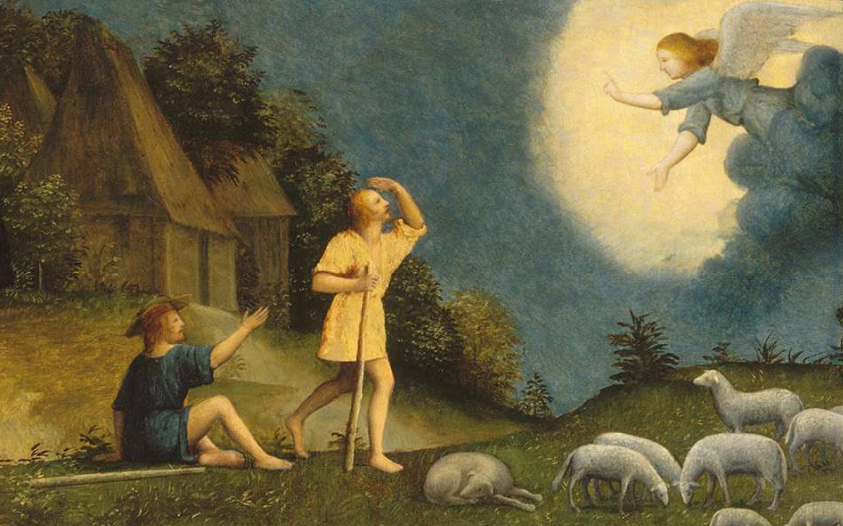Christmas decorations have gone up at our homes, streets, and public places, lightening these spaces and filling us with joy and expectations of Christmas celebration. But one ornament is often missing: the shepherd. Shepherds are rarely on display on decorated front lawns, streets, malls, and public places. Few Christmas tree ornaments are shepherds. Rarely does a Christmas play feature a shepherd as one of the main characters. The same can be said about the frequency of shepherds’ appearances in Advent reflections and homilies.
From the early church, Christmas celebrations have often focused on the visit of the magi in Matthew’s account of Christ’s birth (2:1–12). Luke’s account of the nativity story, including the visit of the shepherds (1:8–20), has received less recognition. But this year, it is time to reclaim the significance of the angelic appearance to the shepherds and their subsequent visit to Bethlehem to see Jesus and reflect on what it says about God’s new beginning in human affairs through the incarnation of Jesus Christ.
When we read the scriptural stories of God’s relationship with the people of Israel, the metaphor of shepherding or flock-herding has a prominent significance. The image of God as a shepherd helps to underline the affectionate bond that exists in God’s relationship with the Israelites. On a figurative level, God is a shepherd roaming available areas of vegetation with the people of Israel, God’s flock, doing everything possible to provide nourishment and keep them safe from violence or harm.
This divine disposition underscores God’s commitment to the well-being of the people of God. We know that shepherds walk far afield searching for vegetation for their flock, putting in long hours on the open terrain and under the elements. They are deeply devoted to their flock’s safety, doing everything possible to protect them from external aggression and violence.
When the people of Israel entrusted their livelihood and safety to God’s shepherding hands, they did so with the firm conviction that their hope of flourishing was guaranteed with God as their shepherd and leader. When the children of Israel ritualize the leadership of God as one of a shepherd, it is indeed a testament to their dependency on God for comfort, security, nourishment, and flourishment (c.f. Ps. 23 and Isa. 40:11).
Ultimately, the coming of Jesus Christ revealed God᾽s decision to dwell among us in human form, which we celebrate with joy at Christmas. Jesus’ presence among us continues to mirror God shepherding presence; Christ identifies himself during his public ministry as the Good Shepherd with a divine mandate to provide safety for God’s flock (c.f. John 10:10 and Matt. 2:6).
The choice to highlight the characteristics of God’s relationship with humanity through the metaphor of a shepherd demonstrates the profound commitment God makes to the well-being of humanity. In this manner, God’s ḥeseḏ and grace are gratuitously lavished on humanity through God’s presence to the human race in Jesus Christ, our shepherd and prince of peace (c.f. Isa. 9:6).
God’s appointed leaders are expected to lead just as shepherds lead their flocks; they are entrusted with leadership as God’s proxies. In scripture, when those with divine appointment to lead the people of God renege on their commitment to lead in the manner and identity of a shepherd, God expresses disappointment (c.f. Jer. 23:1–2).
In the prophecy of Ezekiel, God unequivocally condemns the shepherds God has chosen to lead (c.f. Ezek. 34). They have not strengthened the weak, they have not healed the sick, and they have not tended the wounds of the injured (34:4). The state of affairs under their leadership is complete anarchy, disharmony, and hostility. The people of God have scattered like a flock without a shepherd (34:5–7). Peace is completely nonexistent, and the children of God live in a state of anarchy devoid of human flourishing and growth. Nevertheless, God remains committed to choosing those who will exemplify the identity of a shepherd-leader (Jer. 23:4) and exude presence, patience, and dedication to people’s well-being.
Accordingly, Luke presents a gospel of reaching out and touching the lives of others with the message of peace, as exemplified in the ministry of Jesus Christ. The ministry of Jesus in Luke’s gospel is one of presence (c.f. 19:1–10); when Jesus sends out the 72 disciples, he instructs them to be present to the homes and communities they visit (10:5–9). The two disciples on the way to Emmaus pleaded for Jesus’ presence when they entreat him to “stay with us” (24:29).
Both in the ministry of Jesus Christ and in those of his followers, Luke presents a gospel message of transformation of the status quo, a shift in how humans relate to one another. Jesus takes the lead by committing to a leadership of presence (4:18–19).
It seems to me, then, that Luke intentionally introduces shepherds in his story of God’s coming into the world to show the characteristic nature of God’s relationship with humanity and to invite people into that same kind of relationship with one another. Luke assigns the shepherds a significant role in the nativity story: God chooses them to be the first recipients of the news about God becoming human and being present among us.
Today Christian pilgrims to the Holy Land include in their itinerary a visit to Bethlehem and to Shepherd Field, located in Palestine’s West Bank village of Beit Shaour. The latter location commemorates Luke’s account of the angel’s visit to the shepherds. The pilgrims who visit Shepherd Field allow the significance of this holy site to enliven their spiritual lives and to inspire them to be disciples and leaders of peace, unity, and presence. The pilgrims who pray at this holy site do so because it reminds them of our participation in spreading the message of how God’s joy and peace come into the world through Jesus Christ.
Our celebration of Christmas should include, therefore, significant reflection on the shepherds and on the location where they received the good news. This year’s Christmas celebration comes at a time fraught with insecurity, violence, strife, conflicts, and a frightening decline in human dignity and nobility. Sociopolitical and economic ills around the world have exacerbated the current migration crisis, sending so many people on horrifying journeys across treacherous paths in search of economic and social safety. The ongoing war between Russia and Ukraine, the conflict in Sudan, the Nagorno-Karabakh crisis, the Israel-Hamas uprising, religious and ethnic intolerance, and the daily experience of violence on our streets remind us of the important role of the shepherd-leader and our mandate to promote peace and harmony and drive social reform for the good of all God’s children.
For these reasons, our celebration of Christmas should include a resolve to be messengers of peace and and disciples of a culture of unity and harmony. After visiting Jesus and his parents in Bethlehem, the shepherds return home to share their experience with others and lead them in the celebration of joy and hope for new beginnings (Luke 1:15–20). Let us do the same by sharing with the world the joy, hope, and peace that the coming of Christ into the world brings into our lives.
Image: WIkimedia Commons/Bernardino Luini, Annunciation to the Shepherds, 1520-1525













Add comment